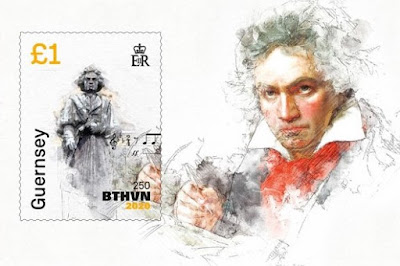250th Anniversary of the Birth of Ludwig van Beethoven
1770 was the birth year of one of the most influential composer to have ever lived- the most frequently performed composer in the world. This year marks the 250th anniversary of the birth of Ludwig van Beethoven, who was born in Bonn, Germany, in 1770.
I have been collecting composer stamps for more then 20 years and Beethoven stamps are one of my favorites. There had been more than 350 LVB stamps issued and more are coming this year being his birth year.
Beethoven's compositions are varied and many like his fiery concertos like the 5th. My favorites are his sedate piano compositions like the Moonlight and Pathetique sonata.
Stamp above issued by Guernsey depicts a large bronze statue of Beethoven, which stands on the Munsterplatz in Bonn, Beethoven's birthplace. Issue date - 21 January 2020.
Date issued 02.01.2020
Motif: A stylized portrait of Beethoven superimposed with a neon clef. Beethoven’s handwritten signature “Bthvn”, with which he signed, completes the arrangement.
“Who does not know the Moonlight Sonata, the piano piece For Elise, the 5th Symphony, which is also called Fate Symphony, and the Ninth Symphony, whose last movement forms the basis of the European anthem. All four pieces of music are by Ludwig van Beethoven, who is considered one of the most famous and most played composers of all time. With his work he has the Viennese Classic led to the highest development and the music of romance paves the way. His creations are part of the cultural heritage Humanity and its handwritten recording of the Ninth Symphony is part of the World Heritage of UNESCO. On the occasion of the 250th birthday of the composer and pianist, the present stamp will appear in early 2020.
Ludwig van Beethoven (baptized 1770 in Bonn) was the scion of a musical family. In 1778 he appeared as a piano-playing child prodigy for the first time publicly and gave a few years later own compositions in print. As French troops in 1794 occupying the Rhineland, Beethoven permanently moved to Vienna and celebrated great success there. Around 1800, he was back then not yet thirty years old, there were first signs of the coming deafness. From about 1813 he had to use ear tubes to to communicate with the environment, and probably around 1815 his last public appearance as a pianist took place.
Between 1802 and 1812 Beethoven composed most of his major works: six of a total of nine symphonies, several Piano Concertos, violin sonatas and string quartets as well as the opera Fidelio. In his last years he created the famous Missa solemnis, other piano and cello sonatas, songs and string quartets. In 1824, the Ninth Symphony was premiered, it applies until today as his most popular work. In early 1827 Beethoven showed symptoms of severe cirrhosis and could not leave the hospital bed. He died on March 26, 1827. In 1888 he received a grave of honor at the Vienna Central Cemetery.“








